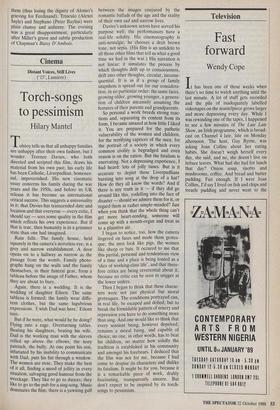Cinema
Torch-songs to pessimism
Hilary Mantel
Tolstoy tells us that all unhappy families are unhappy after their own fashion, but I wonder. Terence Davies, who both directed and scripted this film, draws his material from his own past; his early life has been Catholic, Liverpudlian, homosex- ual, impoverished. His new cinematic essay concerns his family during the war years and the 1950s, and before its UK release it has become an international critical success. This suggests a universality in it: that Davies has transcended date and location and that everyone — every critic, I should say — sees some quality in the film which reflects his own experience. But if that is true, then humanity is in a grimmer state than one had imagined.
Rain falls. The family house, held squarely in the camera's nerveless eye, is a grey and narrow establishment. A door opens on to a hallway as narrow as the passage from the womb. Family photo- graphs hang on the walls and the family themselves, in their funeral gear, form a tableau before the image of Father, whom they are about to bury.
Again, there is a wedding. It is the wedding of daughter Eileen. The same tableau is formed; the family wear diffe- rent clothes, but the same lugubrious expressions. 'I wish Dad was here,' Eileen says.
But if he were, what would he be doing? Flying into a rage. Overturning tables. Beating his daughters, beating his wife. Dad is the working man with the sleeves rolled up above the elbows, the testy patriach, the bully. At one point his son, infuriated by his inability to communicate with Dad, puts his fist through a window. The women are stoic. They make the best of it all, finding a meed of jollity in every situation, salvaging good humour from the wreckage. They like to go to dances; they like to go to the pub for a sing-song. Music dominates the film; there is a yawning gulf between the images conjured by the romantic ballads of the age and the reality of their own sad and narrow lives.
Davies's unknown actors have served his purpose well; the performances have a real-life solidity. His cinematography is anti-nostalgic; he chooses a drab brown tone, not sepia. (His film is an antidote to all those other films that tell us what a good time we had in the war.) His narration is not linear: it simulates the process by which thoughts drift up to consciousness, drift into other thoughts, circular, inconse- quential. It is as if a group of family snapshots is spread out for our considera- tion, in no particular order: the same faces, growing older, growing younger, a genera- tion of children uncannily assuming the features of their parents and grandparents. So personal a work breeds strong reac- tions and, separating its content from its form, I became amazed at how little I liked it. You are prepared for the pathetic vulnerability of the women and children, for the terrifying caprices of the men, for the portrait of a society in which every common civility is begrudged and even reason is on the ration. But the fatalism is enervating. Not a depressing experience, I had heard: lots of jolly tunes. But is it accurate to depict these Liverpudlians bursting into song at the drop of a hat? How do they all know the words? And if there is any truth in it — if they did go around like this, yodelling into the face of disaster— should we admire them for it, or regard them as rather simple-minded? Just when you think that the whole thing can't get more heart-rending, someone will come up with a mouth-organ and treat us to a plaintive air. I began to notice, too, how the camera lingered on faces and made them grotes- que; the men look like pigs, the women like sheep or bats. It occured to me that this partial, personal and tendentious view of a time and a place is being touted as a `slice of working-class life', and that there- fore critics are being reverential about it, because no critic can be seen to snigger at the lower orders.
Then I began to think that these charac- ters were not just physical but moral grotesques. The conditions portrayed can, in real life, be escaped and defied; but to break the formidable pattern of misery and repression you have to do something more than sing. And one would like to think that every sentient being, however deprived, remains a moral being, and capable of choice; no one, in other words, has to beat his children, no matter how solidly the tradition is established in his community and amongst his forebears. I deduced that the film was not for me, because I had come to despise its characters and dislike its fatalism. It might be for you, because it is a remarkable piece of work, drably fascinating, transparently sincere. But don't expect to be inspired by its torch- songs to pessimism.


































































 Previous page
Previous page